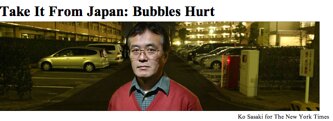Ewwww…:
Ancient rice festival has reputation smeared by ‘therapeutic’ facial cream claims
MSN-Mainichi— A Fukuoka festival dating back to ancient times is growing increasingly popular with Japan’s adult movie fans because it involves smearing gooey, white liquid all over the faces of participants…
…the Oshiroi Festival held every December at the Oyamazumi Shrine in the Fukuoka Prefecture town of Haki…,men draw out handfuls of the gooey mess from the containers they’re carrying and smear it all over the face of all those taking part in the banquet, whether they like it or not, with results closely resembling what the adult video world refers to as a gansha, or facial shot.
Oshiroi is said to have a therapeutic effect on the skin, which has attracted a growing number of young women to the festival in recent years…more…
Ok, ok, here’s the rest of the story. The Oshiroi Matsuri involves most old men smearing ‘therapeutic’ facials on the faces of each other in a thanksgiving festival for abundant crops. The local tourist board obliquely mentions that everyone involved is drunk out of their skulls when they report: “It is comical to see the celebrants weaving their way home after the ritual.”
Watch the Japanese the news video here おしろい祭り—Oshiroi Matsuri (Windows Media, 110 seconds).
Technorati Tags: asia, east asia, japan, northeast asia
 I guess Day-After-Christmas sales are no longer a solely American phenomenon: the KMT has reportedly
I guess Day-After-Christmas sales are no longer a solely American phenomenon: the KMT has reportedly 

 Inside China, I would have liked to run an anonymous public opinion survey to ascertain how people feel, but that won’t happen, of course. So all is left to speculation. I would say that it is a function of one’s age and personal history. For the younger Chinese, it is likely that they have no idea who this person was. After all, they were 5 or 10 years old in 1989 and the subjects of Zhao Ziyang and the June 4 ‘incident’ have been excluded from the public discourse. As for those who were old enough in 1989 to know what went on, I can’t get a reading. For the majority of the country who are mostly rural peasants, they did not hear about Zhao Ziyang or the June 4 ‘incident’ back then, and it would have no material effect on them now. For those who were involved or paid attention at the time, I have no way to gauge the preponderance of opinions — a very tiny fraction have gone into exile and written a voluminous amount of protest materials; perhaps some are still despondent and angry; perhaps some have settled down in middle-class comfort; or perhaps others have even accept that what happened was necessary. I have no evidence about the distribution of these opinions.
Inside China, I would have liked to run an anonymous public opinion survey to ascertain how people feel, but that won’t happen, of course. So all is left to speculation. I would say that it is a function of one’s age and personal history. For the younger Chinese, it is likely that they have no idea who this person was. After all, they were 5 or 10 years old in 1989 and the subjects of Zhao Ziyang and the June 4 ‘incident’ have been excluded from the public discourse. As for those who were old enough in 1989 to know what went on, I can’t get a reading. For the majority of the country who are mostly rural peasants, they did not hear about Zhao Ziyang or the June 4 ‘incident’ back then, and it would have no material effect on them now. For those who were involved or paid attention at the time, I have no way to gauge the preponderance of opinions — a very tiny fraction have gone into exile and written a voluminous amount of protest materials; perhaps some are still despondent and angry; perhaps some have settled down in middle-class comfort; or perhaps others have even accept that what happened was necessary. I have no evidence about the distribution of these opinions.



































